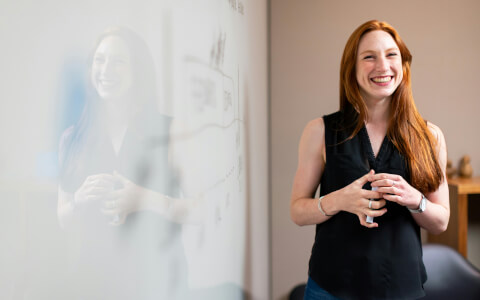You did it—you got through one of the very first steps in the hiring process for that role you’re super interested in.
You completed the always-awkward phone interview and now are left to play the waiting game to see if you’ll land another interview or not.
But, there’s something else you should do besides sit back and compulsively refresh your inbox. What is it? Well, you need to send a “thank you” email after your phone interview.

Why “thank you” notes matter (Because they really do)
Taking a couple of minutes to send this note accomplishes a few things for you. First things first, it’s just polite. That employer invested time and resources in conversing with you, and that’s worthy of your gratitude—even if you don’t go any further in the interview process.
Secondly, sending a “thank you” email bolsters your own reputation and can even increase your chances of landing the job. Believe it or not, a CareerBuilder survey reports that:
22% of hiring managers say they’d be less likely to hire a candidate if they didn’t send a “thank you” note.
Even further, 86% of them state that not sending a note shows a lack of follow-through, and another 56% think that forgetting the “thank you” sends the message that the candidate isn’t all that serious about the opportunity.
Needless to say, that seemingly inconsequential email actually carries a lot of weight—yes, even after a phone interview.
So, how do you write a message that expresses your appreciation but still highlights you as a quality fit for their open role? Read on for everything you need to know to send the perfect “thank you” email after a phone interview.
Want to learn more?
Take your soft skills to the next level with our comprehensive (and free) ebook!
When should you send that “thank you” email?
When it comes to any sort of job search follow-up, one of the biggest questions people have relates to timelines. When’s the appropriate time to get in touch?
Fortunately, the answer here is easy: as soon as possible.
You want to catch them while the conversation is still fresh in their minds (and before you forget altogether!). So, draft your “thank you” email and send it the same day as your interview. If that’s not possible, make sure you get it sent the very next day.
What not to do: The “thank you” email no hiring manager wants to receive
It’s always best to get the bad news out of the way first, right? Here’s a peek at a “thank you” email that’s sure to land directly in the trash—likely right along with your job application.
Dear Hiring Manager,
I really enjoyed speaking with you on the phone today. It was great to learn more about what you’re looking for in job candidates.
On that note, do you have a timeline for next steps in the hiring process? I’d love to know.
Looking forward to hearing from you soon,
Kat Boogaard
5 tips for an impressive “thank you” email
That above message doesn’t seem so bad, right? There were no insults or profane language. So, what exactly is so wrong with it?
Well, for starters, it definitely doesn’t implement the below tips that are crucial for writing an impressive “thank you” email.
Give these best practices a read so you can make sure to use them in your own note (and avoid the same fate as the hypothetical person above).
1. Make it personal
Take another look at that bad “thank you” email example—do you spot anything personalized there at all?
It’s not addressed to a specific person by name. There are no personal anecdotes or tidbits from the phone interview. Heck, it doesn’t even say what position that person is actually in the running for.
Here’s the thing: Particularly if a company is hiring aggressively, you probably aren’t going to be the only “thank you” note that lands in the hiring manager’s inbox that day.
The more you can inject some details and personality into your note, the better off you’ll be. At the very least, you need to:
- Start with a greeting that mentions the person (or people) you interviewed with by name (make sure you double-check your spelling!)
- Include the title of the position that you interviewed for
If you can refresh their memory about something more trivial you discussed during your interview, that’ll be helpful too.
2. Thank them (duh)
That above email example poses as a “thank you” email. But, think again—nowhere in that email do the words “thank you” appear.
As obvious as it might seem, this trap is easy to fall into. You get so wrapped up in including other information in your note, that you forget the most important part: expressing your appreciation.
Before pressing that “send” button, make sure that you actually explicitly share your gratitude somewhere in the body of your message.

3. Reiterate some of your top qualifications
The primary purpose of your email is to thank that hiring professional for their time. But, it’s also a good opportunity to briefly touch on some of your top qualifications to refresh their memory about why you’re a suitable fit for the job.
Even just one brief paragraph will help to tie your experience back to what they’re looking for, and hopefully get your resume moved to the coveted “in-person interview” pile.
In that same paragraph, you can also re-state your enthusiasm about the company and the position. Sharing your excitement about the opportunity certainly never hurts—employers want candidates who are engaged and interested.
4. Ditch your ulterior motives
I get it—you’re dying to know when you can expect to hear back about next steps, and you think now is the perfect chance to get the lowdown on those details.
But, now really isn’t the time. Your goal with this email is to simply offer a heartfelt “thank you” and briefly re-emphasize some of your key skills and qualifications.
Don’t twist this into something that’s completely self-serving. Hiring managers will see through that immediately.
5. Keep it short
Alright, so this is one thing that the bad example got right—we had to give it credit somewhere.
That hiring manager is busy, and they’re not going to want to take the time to re-read your entire resume that’s been pasted into your email. Keep your “thank you” short and to the point, and then let them get on with their day.
Do it right: An example of a solid phone interview “thank you” email
You don’t only want a bad example. So, let’s take the above tips and use them to put together a far better “thank you” email sample.
Hi Susan,
Thank you so much for your time on the phone this morning. I really enjoyed the chance to chat with you and to find out more about the Marketing Assistant role at Company XYZ.
I’m confident that my two years of experience in social media management and my skills in content planning, InDesign, and email marketing would make me a great addition to your awesome team. I’m really excited about Company XYZ’s mission of reinventing the hospitality industry, and I’d be thrilled to contribute my expertise in working toward that goal.
Again, it was great to speak with you, and I’m looking forward to hearing from you soon!
All the best,
Kat Boogaard
P.S. Hope the rest of your marathon training goes well. I’m rooting for you!
See the difference? The above note is warm and friendly, while still being polite and professional. And, it includes enough detail and personality, without being overwhelmingly long.

Are you ready to send your “thank you” email after your phone interview?
Sending an email to thank the hiring manager after a phone interview is important—but it can also be challenging. When do you send it? What do you say?
Fortunately, the above tips and examples can help you craft your own “thank you” email that impresses that hiring manager (go ahead and run through the tips like a checklist!) and keeps your job application far away from the trash can.
For a successful job hunt, take your interviewing skills to the next level by brushing up on your public speaking, body language or leadership skills with GoSkills soft skills courses.
You can also add some impressive credentials to your resume with a GoSkills certification in Excel, project management, design, coding and more!
Ready to prepare even further? Check out our interview guides:
11 Key Graphic Design Interview Questions and Answers
The Top 7 Project Management Interview Questions and Answers
20 Most Helpful CSS Interview Questions and Answers
6 Most Helpful Soft Skills Interview Questions and Answers
13 Most Helpful HTML Interview Questions & Answers
Startup Interview Questions: 8 Things Founders Will Ask You
Prepare for your dream job!
Start learning for free and ace that interview!
Start a free trial



